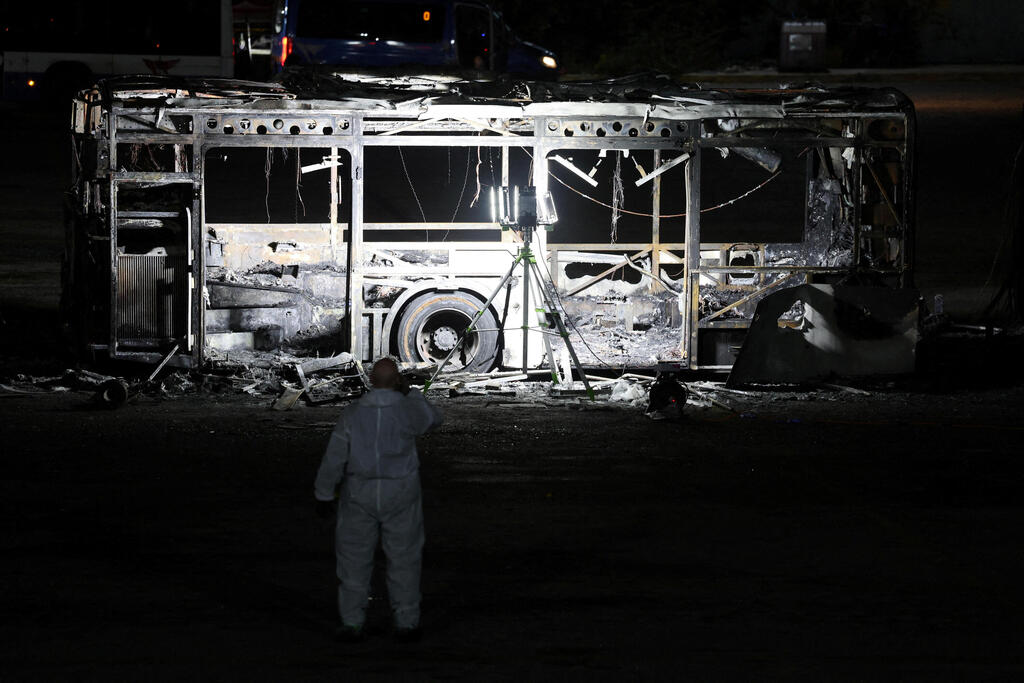The sheer tumultuousness that has transpired over the past 24 hours across Israel's three combat fronts does not indicate, as many might have hoped, an end to violence, but rather that Israel's year-and-a-half-long war has shifted gears. Hamas, Islamic Jihad, and other terrorist groups in Gaza and the West Bank, as well as Hezbollah in Lebanon, have suffered severe blows, with much of their military infrastructure destroyed, shifting their collective efforts into survival mode.
They are reorganizing with the limited manpower and equipment they have left, attempting to rearm. At the same time, they are waging a war of terror and guerrilla tactics aimed at eroding Israeli morale and confidence, and above all, inflicting pain as an act of revenge.
This type of warfare requires neither large forces nor extensive infrastructure but relies instead on small groups of dozens of ideologically driven, revenge-fueled Islamist-jihadist operatives and homemade explosives, easily produced in primitive labs using agricultural fertilizers and hydrogen peroxide.
The murder of the Bibas family
The horrifyingly brutal murder of Ariel and Kfir Bibas, and likely their mother Shiri, bears chilling resemblance to the sadistic methods employed by ISIS during their reign over vast areas of Syria and Iraq between 2014 and 2018. This atrocity, carried out in November 2023 during the early stages of the IDF’s ground offensive into Gaza, was not merely an act of revenge but a calculated effort to terrorize the Israeli public—particularly the families of hostages—and to deter the IDF from advancing further.
The murder was committed by a radical Islamist Salafi group known as "Masters of the Wilderness," which is ideologically aligned with ISIS. However, Hamas did not hesitate to exploit the incident as part of its psychological warfare campaign. In February, Hamas publicly claimed Shiri and her children had been killed and even filmed Shiri's husband, Yarden, as Hamas terrorists delivered the devastating news to him.
Thus, even if Hamas did not carry out the murder itself, it shamelessly exploited the tragedy and bears responsibility as the governing authority and military ruler in Gaza.
Israel must ensure that these horrifying facts are made clear to the entire world and emphasize that Hamas may have deliberately chosen not to return Shiri Bibas, despite this being a blatant violation of the deal's terms. It is also possible that Hamas was deceived by the jihadist group that kidnapped Shiri and her children, knowingly handing over the body of an anonymous Gazan woman to Hamas. However, this does not absolve the Gaza-ruling terror group of responsibility. Israel cannot overlook the failure to return Shiri Bibas, alive or dead.
Nonetheless, caution is paramount. There are still 27 Israeli hostages alive in Gaza, as well as the bodies of dozens of fallen Israelis that must be brought home. This mission remains a top priority, and it is critical not to throw the baby out with the bath water, as happened during the first phase of the deal when Hamas violated the terms toward the end. The focus must remain on completing the agreement to ensure that all living hostages and fallen soldiers are returned to Israel. Only then should Israel reassess its strategy in coordination with the Americans.
To this end, Prime Minister Benjamin Netanyahu is currently pursuing two diplomatic channels: one led by Strategic Affairs Minister Ron Dermer in Washington, engaging with White House officials; and the other involving direct negotiations with intermediaries. It would be prudent for Netanyahu to reinstate Mossad Chief Dedi Barnea and Shin Bet Chief Ronen Bar into the process to ensure continuity and success.
The bus bombing plot
The second major incident, in which a devastating tragedy was narrowly averted, involved the planting of explosive devices on buses on Thursday night. It must be said immediately: the disaster was prevented thanks to the vigilance of an alert citizen who raised the alarm, along with the swift actions of the bus driver and parking compound manager, who promptly called the police. This event is part of the broader war between Israeli counterterrorism forces and terrorist groups in the West Bank.
The city of Bat Yam after the bus bombing attack
(Video: Mickey Schmidt)
The explosives included clear messages, stating explicitly that they were placed as revenge for the IDF's ongoing offensive operations in Tulkarm and the adjacent Nur Shams refugee camp. The influence of ISIS is evident in this operation as well.
Adopting ISIS tactics
Coordinated bombing attacks across multiple locations are a hallmark of Al Qaeda and ISIS operations in Iraq, Syria, and Afghanistan. It appears West Bank terrorists are attempting to replicate this model. It is likely that several perpetrators, presumably illegally in Israel, exploited the late evening hours—when buses were nearly empty—to place the explosive devices in plastic bags under or on top of seats before disembarking at the next stop.
It is unclear what time the timers were set for, but it is plausible that, like ISIS, the operatives sought to create maximum psychological impact by detonating the bombs simultaneously. Even if casualties had been limited, the sheer number of explosions was intended to sow fear, potentially causing mass panic and discouraging Israelis from using public transportation. It is important to note that the explosives were primitive, homemade, and triggered by simple alarm clocks. Nevertheless, a major disaster could have occurred had the devices detonated during the morning rush hour when buses are packed with passengers.
IDF's response
In response, the prime minister and Defense Minister Isarel Katz, in consultation with senior IDF officials, have decided to resume offensive operations in the West Bank, particularly in areas already targeted during the Gaza war. These operations involve setting up roadblocks and re-entering known terror hubs. The objectives are twofold: deterrence through punitive measures and the prevention of additional planned attacks from originating in these areas. While deterrence aims to assert control, it also serves political considerations, as the Netanyahu and Katz both seek to prevent retaliatory attacks by extremist Jewish groups and to reassure the right-wing coalition that the government is safeguarding their interests.
Shin Bet has successfully foiled 154 terror attacks this year within both the West Bank and Israel, including dozens of bombing plots, but their operations are no guarantee of security, as evidenced by the bus bombing plot foiled by alert citizens. "Last night, a clear red line was crossed in the heart of central Israel, which calls for immediate measures in the civilian sphere, including the return of security guards and patrols in every major city, along with more aggressive defensive and offensive actions," a senior Shin Bet official Arik Barbing said adding that Shin Bet must treat this incident as a "real failure" and draw critical lessons from it.
Get the Ynetnews app on your smartphone: Google Play: https://bit.ly/4eJ37pE | Apple App Store: https://bit.ly/3ZL7iNv
The use of explosives in warfare is by no means novel. During the Second Intifada, suicide bombings on buses were a common tactic. However, this type of coordinated explosive attack has not been seen in the current conflict, nor has there been a widespread popular uprising. Still, it is evident that terror operatives, particularly in the northern section of the West Bank and in Gaza, have learned to collaborate, organize effectively, and evade Shin Bet and IDF detection.
Their motivation to carry out revenge attacks using explosives inside Israel remains alarmingly high. The threat posed by infiltrators from the West Bank into Israel is significant and must now be addressed more thoroughly and consistently than ever before to prevent future incidents like Thursday night's events.
As it happens, on the same night, the Israeli Air Force struck weapons-smuggling infrastructure used by Hezbollah along the Syria-Lebanon border. This serves as a stark reminder that on this front as well, the enemy is working to survive and rebuild—making it likely that Hezbollah will soon resume guerrilla warfare against Israel.
The war is far from over. Hostages have not yet all returned, and both Sunni and Shiite jihadists have transitioned to guerrilla tactics. IDF, Shin Bet, Mossad, and the Israeli government still face a long and challenging journey—likely lasting many months—in close coordination with the U.S. administration to achieve stability.







